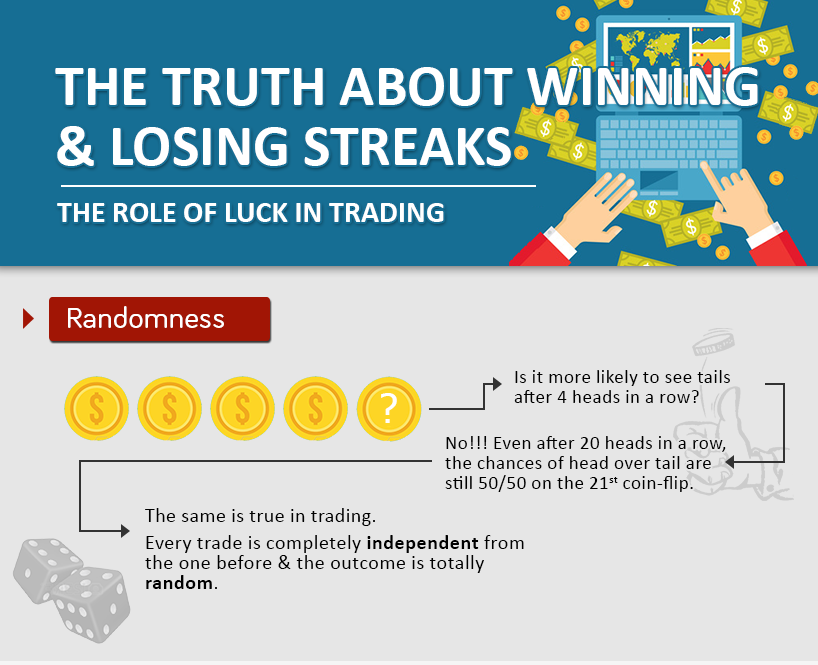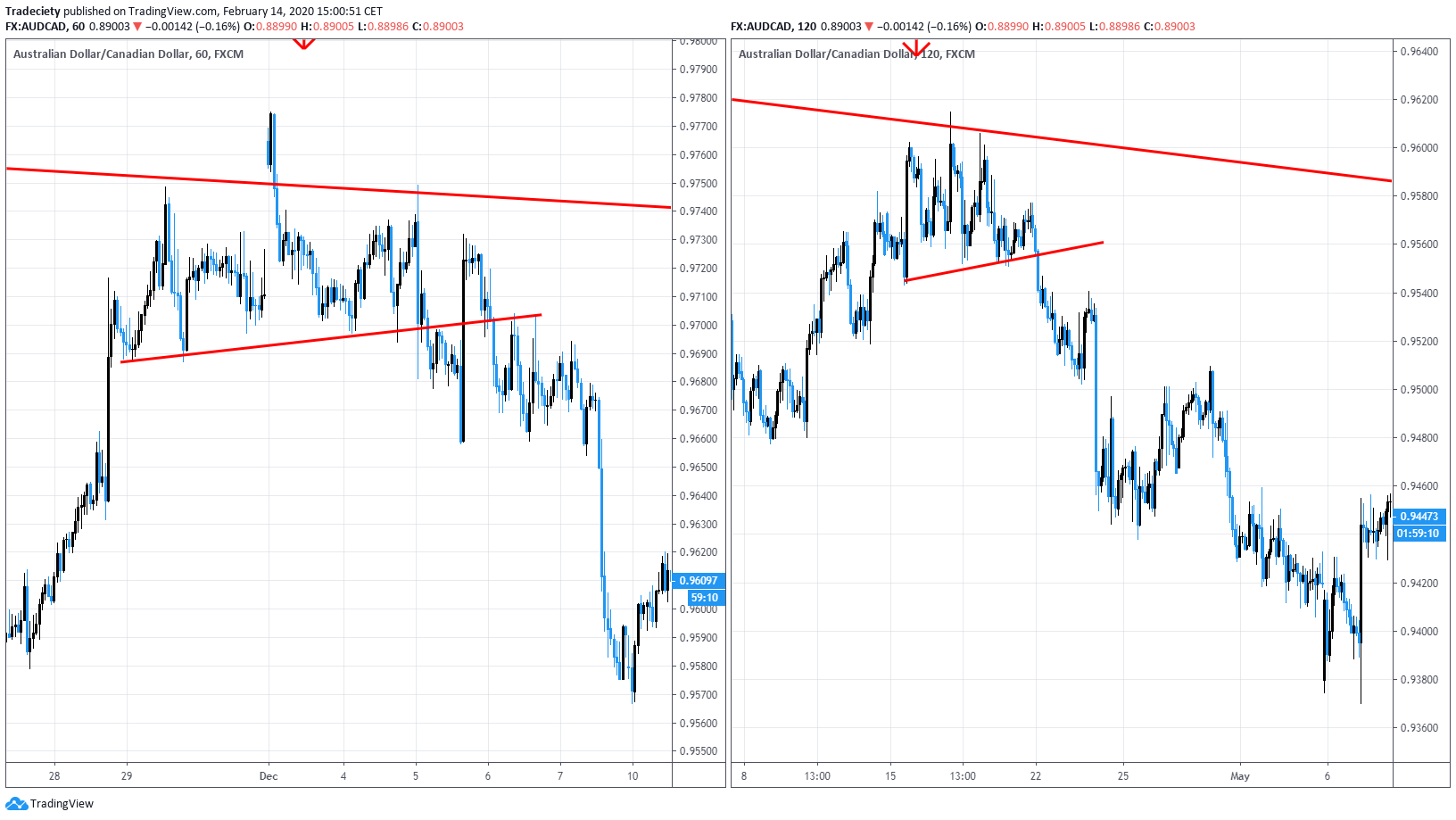3 min read
Scientist Discovered Why Most Traders Lose Money – 24 Surprising Statistics
“95% of all traders fail” is the most commonly used trading related statistic around the internet. But no research paper exists that proves this...
4 min read
Rolf
Aug 21, 2016 8:00:00 PM

How often have you felt invincible after having 5 winning trades in a row and then lost a bunch of money on the 6th trade because you took too much risk? And how many times did you change your trading strategy or adjusted your indicator settings after you lost 4 trades in a row because you thought your strategy wasn’t working anymore?
Those are very common problems most traders face and making the wrong assumptions can lead to disastrous decisions. It is important to understand how likely losing streaks are and how statistics really work in trading. In this article we will break down the most important concepts and provide actionable tips so that you can avoid the most expensive mistakes.
When you see a basketball player score 5 or 6 shots in a row, people say that he is “on fire” and it seems that nothing can stop him. Scientists call this the “Hot Hand Fallacy” and research has confirmed that such streaks only exists within the scope of normal statistical probabilities and that “being on fire” is nothing extraordinary 1 – it’s just how math works. Follow any player long enough and you’ll find such streaks…
Of course, the frequency of those streaks is determined by the level of skill of each individual player and a top player will have much more of those long streaks than a regular high school player – but both will experience those streaks from time to time.
Lesson 1: The “law of large numbers” says that winning and losing streaks are completely normal over a long enough sample size. It’s important that you stop judging your system based on 1, 2 or 5 trades and understand the implications of long-term thinking. Never change your system after a few losing trades!
We as humans are particularly bad at understanding probabilities – who likes math anyways?! We get into our cars every day and don’t worry for a second about what could happen; but, we feel uncomfortable when we get into a plane twice a year for our summer holidays. And we are way too optimistic about winning in the lottery as well.
“I guess I think of lotteries as a tax on the mathematically challenged.”
― Roger Jones
But the problems don’t end here. Events with random outcomes are really challenging our way of thinking and humans try to come up with arbitrary rules or ideas that help them create a sense of control over events which they have no control over:
In craps, people throw dice harder when they bet on a high number than when they want to see a smaller number. When flipping coins, people believe that it’s more likely to see heads after the coin has shown tails 4 times in a row. When playing the lottery, people believe that they have a higher chance of winning if they pick the numbers themselves.
Probabilistic events with random outcomes mean uncertainty and humans do as much as they can (or what they believe they can) to eliminate the feeling of uncertainty. Research found that a creating a feeling of control, even when we don’t have control, makes us feel healthier.2 This, of course, doesn’t change the outcome, just how we perceive the event and how we make our decisions. People who believe that they have some control over completely random outcomes are less risk-averse and over-estimate their chances of beating the odds. In trading, this can easily lead to increased risk taking and over-confidence.
Lesson 2: Accept randomness and understand that one trade is completely independent from the one before. To make things worse, the outcome of a trade is totally random and out of your control as well. Creating arbitrary rules that aim at creating the feeling of control can lead to over-optimism if the trader isn’t aware of it.
The most dangerous part about the “Hot Hand Fallacy” is that it changes peoples’ perception about their level of skill. After having netted 5 shots in a row, players often start taking shots from difficult positions where they have a much lower chance of making the shot and so ruin their stats and harm their team.
Research shows that individual investors and traders trade more actively when their most recent trades were successful.2
Increasing position size because you think that you can use the winning streak to boost your performance almost always ends in a disaster. Some traders believe that they can “feel” where the market is going next after a few wins in a row. It’s very common to see that those traders wipe out a substantial amount of their past gains with just a few trades. We have all been there, right!?
Lesson 3: You don’t suddenly become a better trader. Therefore, never change your approach to your money and risk-management depending on your most recent results.
Do you think that after 6 losing trades in a row, your trading strategy doesn’t work or that you are a bad trader? It probably doesn’t even take 6 losing trades to make most people doubt their trading strategy. What if we told you that it’s not the case and the system you are about to give up on, could make you all the money you ever desired? If traders would stick to their strategies just a little longer and not give up so quickly during times of adversity, we’d probably see a lot more profitable traders.
| Losing trades in a row | How often does it happen? * |
| 2 | Once every 6 trades |
| 3 | Once every 16 trades |
| 4 | Once every 40 trades |
| 5 | Once every 98 trades |
| 6 | Once every 245 trades |
* Calculations are based on a system with a 60% winrate
Lesson 4: Losing and winning streaks are normal and no matter how good you are, they’ll happen. Don’t give up on your method too early and hang in there. Every streak will end.
During winning streaks, it’s especially important to avoid over-confidence. Never increase your risk when you are on a roll. Consistent position sizing is extremely important when it comes to reducing account volatility. Also, don’t over-trade because you suddenly think that trading has become easy. Always make sure that you follow your rules and that you execute your trades according to your system.
During losing streaks, the same holds true. Don’t try to make up for the past losses by increasing position size – you’ll most likely just end up with a larger drawdown. Most importantly, don’t make any changes to your strategy. You can only build a trading edge by executing your trades as consistently as possible. This is hard to understand for new traders, but it’s the corner stone of profitable trading. Instead, focus on how well you execute your trades and don’t worry too much about the outcome.
Tip: Before you start your trading day, review your past 10 or 20 trades to get a feeling for your overall situation and to avoid making any emotionally caused mistakes. Always be aware of your current state of mind.
References:

3 min read
“95% of all traders fail” is the most commonly used trading related statistic around the internet. But no research paper exists that proves this...

3 min read
Trendlines can be great trading tools if used correctly and in this post, I am going to share three powerful trendline strategies with you.

3 min read
Choosing the right trading journal is essential for traders wanting to analyze performance, refine strategies, and improve consistency. In this...